|
 As a reminder, gentlemen of the Assembly: the proposal is not meant to be a unalloyed bill in its final form. As a non-legislator, I submit it to your august body to do what you will to it. If you would like to introduce amendments and the like, feel free to do so. I simply wish to bring the idea to the national discourse, so that the rights and responsibilities of France's women may be at the forefront of the minds of our nation's statesmen.
|
| # ? Nov 17, 2012 18:44 |
|
Maximo Roboto posted:
This is the same for my Referendum Proposal on Haiti, although the core of it must be maintained (all Men and Women of Haiti can vote), if I am not to wash my hands of it.
|
| # ? Nov 17, 2012 18:50 |
|
 QPQ isn't on but the current budget has a major error that you guys might want to fix unless you want to keep going into debt. Luckner somehow conjured 15 credits out of thin air to pay off debt with. In other words, at the current time, you're spending too much money, and you don't have enough money to pay off the building interest! Keep failing to pay interest and you will face steadily increasing interest rates on your current loans and may risk a default. QPQ isn't on but the current budget has a major error that you guys might want to fix unless you want to keep going into debt. Luckner somehow conjured 15 credits out of thin air to pay off debt with. In other words, at the current time, you're spending too much money, and you don't have enough money to pay off the building interest! Keep failing to pay interest and you will face steadily increasing interest rates on your current loans and may risk a default.  (GM-Amended) Luckner Budget posted:
|
| # ? Nov 17, 2012 18:50 |
|
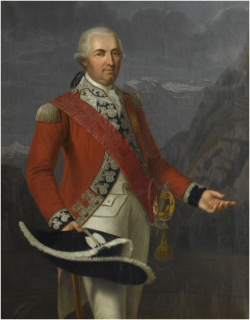 War Minister von Bachmann Marshal Luckner was a great tactician but his logistics always left something to be desired... I propose that taxes on the poor be eliminated. With our tax collectors not pestering paupers they will have more time to review the better members of society, just as it should be. We do our noblesse oblige by caring for the weak. Hopefully this strategy will see gains in tax efficiency in the future. I propose that taxes on the wealthy, and on the land they own, be equalised at 30% in order to prevent the fiddling of finances that the perpetually idle nobles and capitalists always get up to. Contributions Directes: Tax Efficiency: Low 30% tax on nobility (14) (from 25%) 30% tax on bourgeoisie (13) (from 25%) 25% tax on the petit bourgeoisie (3) 0% tax on working poor (0) (from 20%) 30% tax on land and estates (15) We will attempt to pay down the debt. I would rather declare a moratorium on interest but apparently this is frowned upon by bankers (you will recall that our Saviour Jesus Christ opposed usury, which leads me to believe that bankers are in fact one front of the scheming minions of Belphegor, the demonic prince) Debt Current Market Interest Rate: 2.0% Debt growth per turn: 0 [-0 interest, -0 spending] Payments to debt interest per turn: 12 Payments to debt reduction per turn: 3 Debt Credits: 525 ---105 credits to Swiss banking houses ---420 credits to various private investors Possible creditors: Private citizens. Dutch and Swiss banks willing to loan more only at higher than market interest rate while stability of government still in question. Trade Tariffs: 5.0% tax rate on all overseas imports and exports. ---1 from salt imports [Pondicherry - France] ---3 from sugar imports [Saint-Domingue - France] ---1 from cocoa imports [Martinique - France] Trade Deals: Free Trade Compact w/ America --- 1.0% growth from textiles [France - America] --- 1.0% growth from cotton [America - France] The sorry state of our finances must be addressed somewhere, so the monetisation of the debt is absolutely necessary. Government Revenues: Minting: 25 (+2.5 inflation/year) (from 10/+1.0pa) Inflation: 5.50% In preparation for the expansion of the national logistics corps I suggest improvements to transportation and infrastructure. The over-funded artists can make sacrifices, saving money for alms for the poor. I agree with my colleague in the Naval service that his branch is sorely underfunded, though not to the same degree. The colonies are supposedly peaceful so they can see a reduction in upkeep. Finally, the useless National Guard should be scaled back with an eye to merging it into the Army in the future. Manufacturing: 3/3 Agriculture: 4/4 Infrastructure: 5/6 (from 4) Transportation: 2/2 (from 1) Culture: 2/2 (from 3) Police: 6/8 National Guard: 1/4 (from 2) Army: 12/12 Navy: 8/10 (from 6) Intelligence: 1/2 Courts: 1/1 Clergy: 1/3 Education: 4/4 Healthcare: 2/5 Colonies: 6/8 (from 7) Food Relief: 2/2 (from 1) Subtotal: 60 Yearly Credits Free Credits: 0 Credit Income: 75
|
| # ? Nov 17, 2012 18:54 |
|
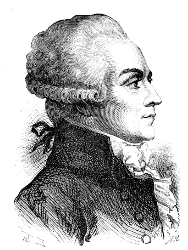 This makes my Closing the Loophole Act even more important. In addition, I propose the Stop paying our enemies Act, which nullifies the debt owed to the emigres. Finally, the National Guard is a valued part of our nation, and I will not support any cuts to it. The navy can make do with a slightly smaller raise. Temporary minting will cover the rest. Madame de Gouges, I am sympathetic to your entreaties. I invite you to write my privately to further discuss the matter. My proposal: Government Revenues: Minting: 25 (+2.5 inflation/year) (from 10/+1.0pa) Inflation: 5.50% Manufacturing: 3/3 Agriculture: 4/4 Infrastructure: 5/6 (from 4) Transportation: 2/2 (from 1) Culture: 2/2 (from 1) Police: 6/8 National Guard: 2/4 Army: 12/12 Navy: 7/10 (from 6) Intelligence: 1/2 Courts: 1/1 Clergy: 1/3 Education: 4/4 Healthcare: 2/5 Colonies: 6/8 (from 7) Food Relief: 2/2 (from 1) Subtotal: 60 Yearly Credits Free Credits: 0 Credit Income: 75
|
| # ? Nov 17, 2012 18:59 |
|
Georges Cadoudal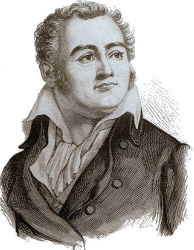 On Finances posted:Robespierre is mad. He calls the National Guard a "valued part of the nation," but what have they done? What victories for crown, country, and God do they have in their history? Nothing! As easily as they were created, they may be disbanded. What connection do these Parisians have for the rest of the Kingdom, save for a desire from its leaders to swagger across all the lands of France and boast of their virtue, and slay the innocent? Letter to Francois-Joachim, Cardinal Protector of France in Rome posted:Hail, Your Eminence!
|
| # ? Nov 17, 2012 19:11 |
|
 Marquis de Lafayette, Commander of the National Guard The rate of minting is absurd and a severe danger to the long term prospects of the French economy. I would support a halving of National Guard funding if it meant a decrease in minting to a reasonable level - otherwise it seems merely to be a political attack on the defenses of Paris. I support the Closing the Loophole Act and the Stop paying our enemies Act, more out of financial necessity than bitterness. The dire straits of our finances leave us no other choice, and if anyone must suffer let it be the traitors who abandon our country at the first sign of troubles. The attacks on the National Guard, which has only tried to secure the Constitutional Order, Liberty, and Unity of France, worries me. We have been consistently alienated by our own King and his greatest supporters, who we have only tried to safeguard. It is a shame they have taken this path instead of working with us and the Assembly. I again call on any and all lend their voice in support of the Breton Rebellion Act, the most important bill before the Assembly this session. Even though the King has promised a veto, we must send a clear message that the democratic will of France is to remain whole and indivisible! I also offer my support to the Camp Followers Act, a reasonable proposal to build up patriotism among the brave Women of France.
|
| # ? Nov 17, 2012 19:27 |
|
 War Minister von Bachmann Minting should continue until the wealth held by Luckner's heirs is safely inside the treasury. I agree with Closing the Loophole and Stop Paying our Enemies since those émigrés are traitors to their King who have fled him in his time of greatest need, surrounded as he is by madmen, Satanists and petty tyrants. Pray tell, Marquis de Lafayette, which criminals has the National Guard arrested recently? You haven't even attempted to bring Jacobin murderers to justice! What threats to Paris exist that cannot be stamped out by the righteous fury of His Majesty's armies? The only threat is your demagoguery and the weapons held by untrained hands under your command!
|
| # ? Nov 17, 2012 19:46 |
|
 Another lie from a traitor. He says I steal the bread from the mouth of the hungry, but my budget doubles the funding for food relief. Legitimate differences of opinion are one thing, but these are verifiable facts! I have heard from the Monarchists that the National Guard are to be solely entrusted with the police, and that they are to be entrusted with none of it and have their funding cut. Which is it to be? Why the relentless assaults on a vital pillar of the nation?
|
| # ? Nov 17, 2012 19:46 |
|
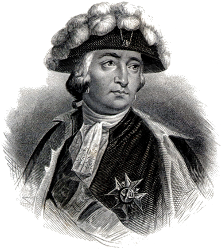 Louis Philippe II, “Citoyen Egalité”, Duke of Orléans My fellow Frenchmen, I am saddened to see how our great nation has devolved into its current state. I cannot fathom how our King can support the rebellion of an entire province of France. And while I am loathe to condone any act which may result in French blood shed on both sides, I must strongly support the Breton Rebellion Act. The Breton government is not popular even among its own people, and to pretend it is anything more than a sham is to ignore the plain hard facts. Here are a list of my positions on the rest of the acts: The Agricultural Innovation Act- No. We have not even seized the emigre lands yet and even if we did they should be used to pay down the debts owed by the Government. Defend the Borders Act- Yes Reinforce the City Guard Act- No, due to the current budget situation this is simply not possible. Closing the Loophole Act- Yes, for reasons listed above with the Agricultural Innovation Act. Stop Paying our Enemies Act- Yes The Province of Haiti Act- Yes Breton Semi-Independence Recognition Act- No Secession Act- Yes Camp Followers Act- No Haitian Referendum- No
|
| # ? Nov 17, 2012 19:46 |
|
Georges Cadoudal Letter to Monsieur B., Theater proprietor posted:...Mme. Olympe has given me the honor of reading her drafts for her latest play "The Agony and Ecstasy of Joan of Arc: A Modern Morality Play," and I must say that it exceeded every literary expectation I had. It is amazing, she has departed from the style of Molliere and the other lauded playwrights, but her departure feels natural, like a return to a cold mountain spring after having sweetened wine. Her Joan is faithful and loyal, true to the character of the Maid of Orleans, and I find few historical gaffes (and you know how much I desire to find them!). I recommend to you, I implore you, that you send for a copy of Mme. de Gouges' play, and to say the same to your friends and colleagues in theater. This play deserves to spread beyond a few parlors in Paris, it deserves to be seen everywhere, by people of all classes!
|
| # ? Nov 17, 2012 19:52 |
|
 Hell yeah the Camp Followers act is a good idea, and is the first step towards gender equality in France. Olympe de Gouges is twice the patriot and thinker you Jacobins will ever be, and I hope she gets voted into some sort of office soon. After all, "Woman has the right to mount the scaffold; she must equally have the right to mount the rostrum."
|
| # ? Nov 17, 2012 20:02 |
|
 Steward Charles Armand Tuffin, marquis de la Rouerie Steward of the Throne of the Elective Duchy of Breizh/Brittany for Duke Luis II Open Call to the French Assembly's Non-Radicals posted:Non-Radical men of the Assembly,
|
| # ? Nov 17, 2012 20:03 |
|
 An address to the assembly posted:Gentlemen, I hold in my hand a letter from the Traitor Tuffin, attempting to dictate terms to this august Assembly. He threatens war if we attempt to reassert the rightful jurisdiction of France over the rebelling departments. The question is, will we allow ourselves to be threatened by a trumpted up tin-pot "Steward" and his handful of men? Not so long as I draw breath!
|
| # ? Nov 17, 2012 20:05 |
|
 196x250 Alexis Le Veneur de Tillières, commandant l'Armée du Rhin Address to assembled troops at Grand Camp in Strasbourg, 7 March 1792 Far be it from me, as an impartial observer of the political arena, to offer my unsolicited opinion on matters of stacking coin and compounding interest; my place is here in the drill field with you, my resplendent soldiers of glorious France! But so many of my staff--and indeed enlisted soldiers, bless your curiosity!--have asked my counsel on the economic woes facing our nation that it would be neglectful of me not to oblige. Everyone gathered here today knows how imperative it is to keep the Army of France well-funded and its soldiers well-fed. You all know my reputation as a friend to the common soldier! It would appear that the wise men in charge of legislating are also friends to you, for they have introduced a number of Acts to ease our financial burden and secure all of our futures in this great military. Two of these potential laws in particular--the Closing the Loophole Act and the Stop Paying Our Enemies Act--are, in this humble soldier's lay opinion, absolutely necessary for the economic security of France. I call upon every soldier in my command to support these Acts, and to write home and urge your families to do the same! The livres these Acts provide will be the key to not only a prosperous France, but a healthy and comfortable French soldier as well! Thank you, my dear men, for your patience as I address you with these mundane speeches. In gratitude, this morning all enlisted troops will have an extra ration of bread and coffee!
|
| # ? Nov 17, 2012 20:09 |
|
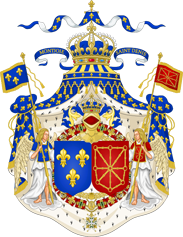 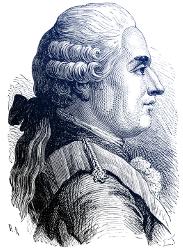  Louis Stanislas Xavier, comte de Provence, Commander of L’Armée des Princes, Regent of the Kingdom of France and Navarre, acting in lieu of His Most Christian Majesty The King, Louis XVI Once again, the radicals and their friends seek to strike at my people, the émigrés. Not only do they take our land, and not only do they wish to grave-rob the recently-deceased Luckner, but they wish to even default on the rightful debts that they owe us. Is there nothing that they will not do to strike back at those who fled to protect themselves and to protect others? These republicans like to pretend that we are traitors, villains, and boogeymen, but in reality the true traitors are these Jacobins and all who would support their measures. You may think that you will get away with these crimes just because we have left France, but do not fool yourself so! Every time you mistreat the nobles and the émigrés, all of Europe watches and recoils. There will come a day when the good people of Europe have had enough, and that will be the day where you pay for the injustices you have committed.
|
| # ? Nov 17, 2012 20:23 |
|
Père Duchesne's "Funny-Pages"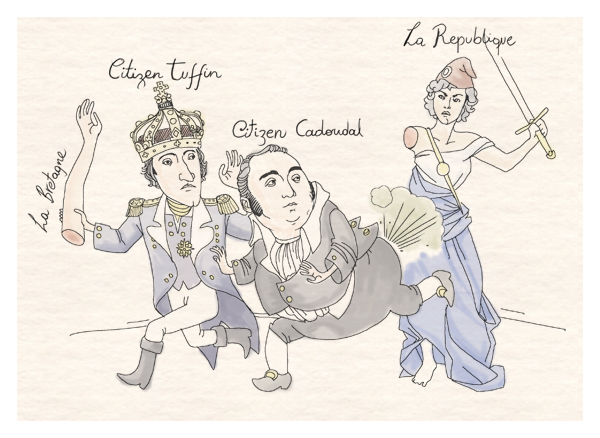 "Quickly, my beloved Georges, for what we plan to do with this arm will make de Sade look like a virginal choirboy in comparison!"
|
| # ? Nov 17, 2012 20:25 |
|
SexyBlindfold posted:Père Duchesne's "Funny-Pages" Print this comic far and wide. From Brest to Marseilles!
|
| # ? Nov 17, 2012 20:27 |
|
((this is like the worst time for a deadline for me, sorry)) Minor clerical error: Danton votes Oui for the Breton Rebellion Act as wrll.
|
| # ? Nov 17, 2012 20:42 |
|
SexyBlindfold posted:Père Duchesne's "Funny-Pages" OOC: holy shit this rules IC:  Marquis de Lafayette, Commander of the National Guard Sacre Bleu! C'est merveilleux!
|
| # ? Nov 17, 2012 21:39 |
|
 BRISSOT OF THE GIRONDINS I lend my support to the following acts: Breton Rebellion Act City Guard Reinforcement Act Defend Our Borders Act Secession Act Anything less than this is spitting in the face of France.
|
| # ? Nov 17, 2012 22:19 |
|
 Written from the bathtub of Jean-Paul Marat Citizens, it disappoints me greatly that the people of Paris, the sans-culottes on whose backs France rests, cannot have their voices heard clearly. These men are too busy working to attend your sessions and too common-sensical to listen to your prattle, so they remain silent. Thanks to my illness, I have more time than most to consider my thoughts, and I am happy to put my time and my words to use for the benefit of the people of Paris against the leeches like the King and the nobility and the cowards who would not take action against them. Our very liberty is at stake! If anyone wishes to contact me, please send me a letter, I will receive it and reply from my bathtub as per my ancient custom. You may reach me via private courier message here or mail me at pattersongsa@gmail.com. I look forward to working with those of you who wish for a new Paris. Sincerely, Jean-Paul Marat
|
| # ? Nov 18, 2012 00:54 |
|
 NEXT TURN IS DUE ON MONDAY, NOV. 19TH BY 6:00 PM EST. JOIN AS WHOEVER! NEXT TURN IS DUE ON MONDAY, NOV. 19TH BY 6:00 PM EST. JOIN AS WHOEVER!  News for Spring 1792 - Turn 3 NEWS FROM THE 1ST FRENCH ASSEMBLY, 3rd SESSION: 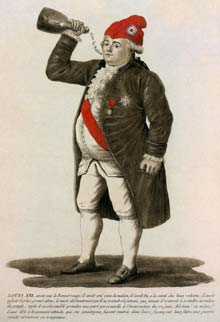 - The Breton Rebellion Act - The legislature votes by a 2-1 margin in favor of intervention in the Breton rebellion, commanding its immediate destruction. As he had promised, the King vetoes the act, sending shockwaves through the nation and outrage in the streets of Paris. Cries of “Monsieur Veto” begin to spread through the streets of Paris. Actions the following day prevent the veto from taking effect, however. - The Province of Haiti Act is openly condemned by pamphlets and rumors originating from the American ambassador’s office. Wary of alienating their American allies and seeing an end to the profitable free trade agreement with the United States, many independents vote against the act, causing its failure. - The King appoints Karl Josef von Bachmann Minister of War to fill the vacancy left by Luckner’s death. - The Legislative Assembly is suspended until further notice by order of the Paris Commune. All attempts to reconvene will be stopped with extreme prejudice. All bills not passed in this assembly may be voted on later, or implemented by the President of the Legislature at his and the King’s discretion. DOMESTIC NEWS: 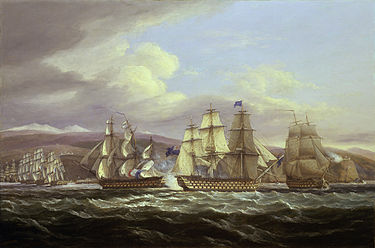 - The Minister of the Marine dismisses the comte d'Esting from his command as admiral, citing his radical and unpopular attempts at reform as the reason, though several of the admiral’s closest officers depart with him. He is replaced by a little known figure widely regarded as little more than the Minister’s “drinking buddy”. Quickly moving to defuse the situation, women are once more expelled from the ships of the navy and from the shipyards, causing minor disconcertion among the ex-sailors, but prompting the mutineers in Toulon to surrender control of the ships back to the ministry. - The Flotte d’Atlantique hastily leaves its moorage at Brest and begins a blockade of the major Breton port cities, massively disrupting commercial activity. British ships are refused passage through the blockade, and the flow of arms into Brittany by sea surreptitiously stops. The threat of famine rears its ugly head yet again, with stores beginning to run low and trade from France almost nonexistent, and the Breton people cry out for help. - Strange men begin lurking outside the Jacobin Club in Paris, intermittently stopping those who pass through the area and demanding even stranger things of them. Some claim they are salesmen, others National Guards, but all spray the strange sulfur-scented perfume they carry strapped to their waists. On occasion, the subjects of these ‘sales’ can be seen coughing and wheezing heavily. 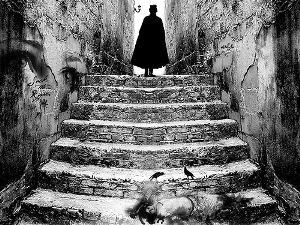 - Dozens of men and women have gone missing from the streets of Paris in recent weeks, having left their homes or places of business for a short walk through the Rue St Jacques - the only common feature between them - and then never being heard from again. A growing number of Parisians are demanding Lafayette put an end to these disappearances, and many fear for their safety. - That pungent smell of sulfur infiltrates the home of Saint-Just, rising up from his fireplace in tandem with a strange, dancing blue flame. He suffers from some minor coughing fits but quick thinking by the Jacobin radical puts out the flame before any more harm can be done. “Another assassination attempt on a Montagnard?” Many radical delegates are beginning to whisper of the need for safety, perhaps even a committee of some kind to oversee it. - The Hotel Mazarin begins distributing copies of the Malleus Maleficarum to its guests, often with the Bible in the other hand, giving the establishment a reputation for being host to reactionaries and clericalists, and some say that the emigres are making their quiet return to the Parisian stage. - A brigade (7500 men) from the Armee du Nord is split off under the comte de Rochambeau’s direct command and begins a march to the Breton border across the rolling Norman hills. While passing through an isolated fishing hamlet, locals flock to the Marechal to tell him of “the Sodomites”, who seized several small merchant vessels that had stopped there for supplies and forcibly recruited several of them into their ranks. The ships were seen setting sail for the west. 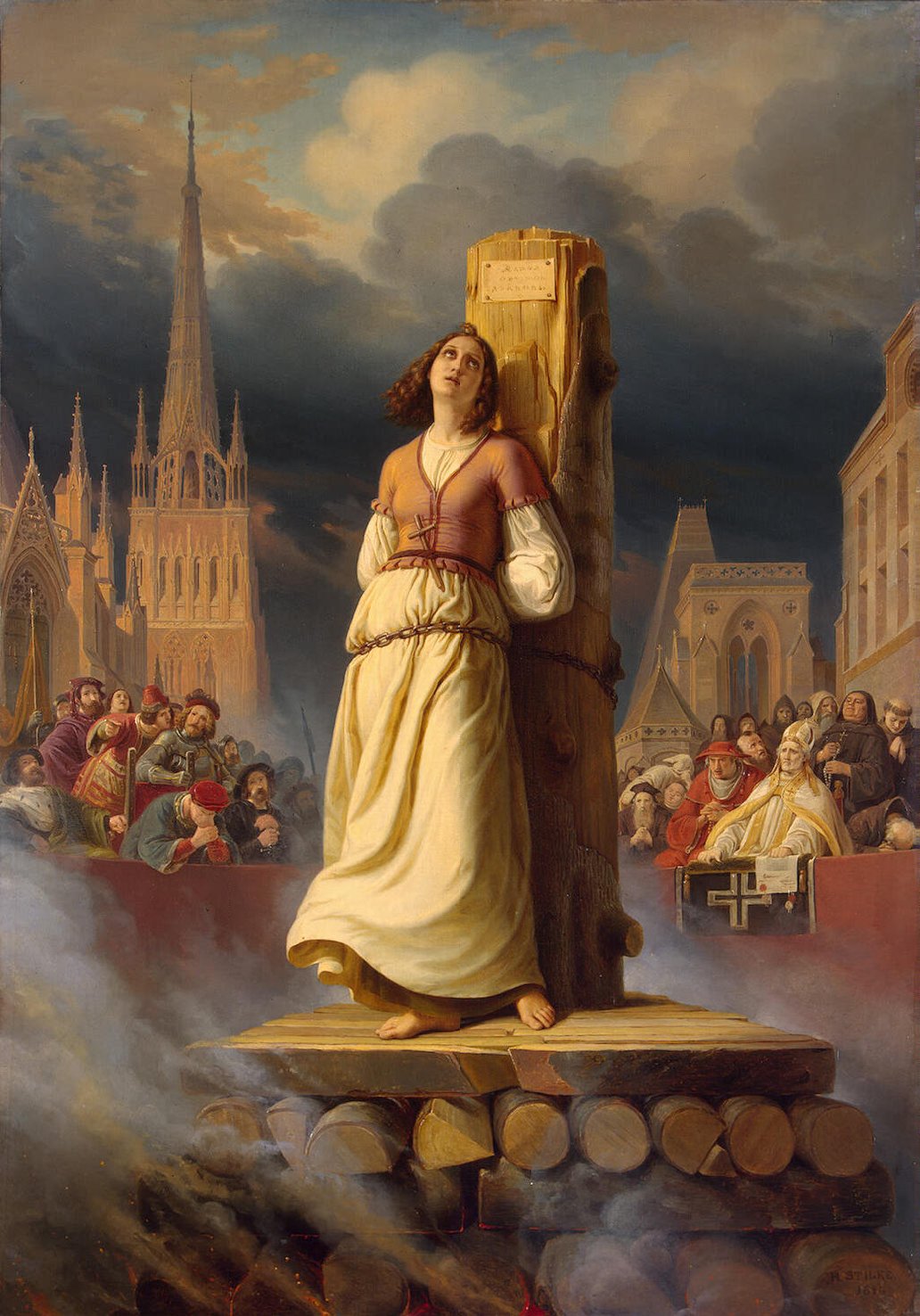 - Jeanne d'Arc, l'agonie et l'extase: une moralité contemporaine is performed live in the Cour des Miracles and soon draws widespread attention despite the best efforts of the middle class establishment, becoming a wildly popular drama, so popular that several opera houses invite the play onto their stage. Tickets are sold in a staggered structure similar to those in a progressive tax system, with prices based on wealth. This often amounts to little more than the booth attendant sizing up the approaching customer, and while some complain, the vastly reduced prices for the poor make these fall on deaf ears. - Jeanne d’Arc is not subtle with its commentary. The traitorous Burgundians speak in thick Breton drawls, the Duke of Bedford - regent for the King of England - dresses in the exact garments that the comte de Provence did during his last stay in Paris, and the titular heroine often scolds the Dauphin for his excesses and teaches him the proper way to rule. At the closing scene, the martyrdom, she proclaims that she will die for a united France, a France indivisible, one ruled by a king loyal to the people and not a reactionary or a traitorous usurper like Henry VI or Philip the Good. An epilogue features a scene between the Pope and Pierre Cauchon - who bears thick sideburns and has a puffy face - with the former condemning the latter for heresy and for betraying a saint. The bob haircut becomes popular among women and begins to be seen worn by the matriarchs of many prominent families, largely as a result of the lead actresses’ hairstyle. - Demands for Joan of Arc’s canonization reach the Pope, who begins vigorously investigating whether any of the many miracles attributed to her were in fact miracles. This is made difficult by growing anti-clericalism in France, but a decision should be made in a few years. - Articles infiltrate Jacobin circles linking Robespierre, Lafayette, Roux and Babeuf (“The Strange Bedfellows”) with the criminal de Sade. Saint-Just and Danton, surprisingly, are spared any such attacks, and their popularity among the radicals increases. - Supplies arrive for the Cambions from across the channel, picked up in Normandy. Some further recruits rally to de Sade’s banner, mostly being lured in by gold or promises of it, but many are too terrified of the man to dream of fighting for him. - de Sade’s motley armada is turned away from an attempted landing at Nantes by a squadron of the Flotte l’Atlantique blockading the city, forcing them to disembark at a small inlet just south of the river Loire. Denied their precious Breton prize, they wreck havoc on the locals there and cause entire villages to disappear overnight, their citizens murdered and their homes set aflame. Many villages in the area voluntarily offer to join with Brittany if they will destroy de Sade and wipe his Cambions from the face of the Earth. - The Ministry of Justice orders an investigation into the attack on Robespierre’s life. They discover that, in fact, there had been three assassins, though they find no information on their identities. The very idea that two assassins are still lurking in Paris disconcerts the city. - Construction on factories continues in the Rhine, with many German-speaking immigrants flocking in from the neighboring Palatinate in anticipation of the freshly available work. - Throughout the taverns and saloons of Paris, a few men voice their disconcertion with Lafayette’s growing influence and power in the city. Most people make little of this. After all, it’s not as though he’s planning to attack the king. 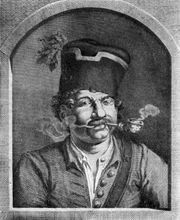 - Jacques Herbert publishes his own newspaper, Le Père Duchesne. The coarse, vulgar language does little to attract the bourgeois or the nobility, but finds an audience in the radical working class. It is considered closely related to the Enragés movement and mildly sympathetic to the Jacobins. It also slanders Georges Cadoudal and Charles Armand Tuffin as Breton whores, who have sold themselves at France’s expense. Illustrated reading aids and helpful rhymes, aimed at the illiterate improve its readership among the poor. Literacy sees an increase. - To support his literary efforts, Herbert seeks out sponsors in the bourgeois. Being in support of the status quo by nature, he is only able to attract a few radicalized donors for Le Père Duchesne. There is little interest in further revolution among France’s wealthy, but he collects enough donations to keep the printers in operation for the next few months. - Louis Philippe speaks publicly in support of the Breton Rebellion Act, drumming up support across France. He plays upon national fears of France being dissolved. The influence of his speeches are amplified by renewed interest in the Hundred Years War, brought on by the popularity of Jeanne d’Arc. When the act passes in the Legislative Assembly, but fails, Parisians rally outside of the Palais des Tuileries demanding the death of the King, his family and the installation of the Duke of Orleans on the throne. - French citizens notice a significant number of German speakers under the control of Lafayette, sparking national concern that the army is now dependent upon foreign mercenaries. Despite efforts from a number of figures, including Louis Philippe and Lafayette, to undermine these fears, confidence in the French military drops. - The writings of De Sade slowly disappear from Jacobin clubs, being replaced with L’Ami du Peuple. While some are saddened to lose Marquis’ interest take on the news, most would be happy never to see the man’s words again. Saint Just offers slightly more bloody, albeit less sexual, columns. THE MAY REVOLUTION:  - The morning following the King’s veto is marred by violence. At three in the morning, before most of Paris has awoken, General Lafayette awakens his troops. He declares the King a traitor, openly defying the constitution that allowed him to keep his crown, and that they must arrest him and bring him to justice. This is met with cries of approval, as 30,000 men gather behind Lafayette and begin a march to Tuileries Palace. - A loyal soldier of the crown manages to desert the guard and arrive at the Palace on horseback before Lafayette can arrive. He quickly informs King Louis XVI of the approaching assault on Tuileries. The entire grounds are put on alert and the gates closed. King Louis gathers all his men in his castle, the 1,500 members of the National Guard, 773 Swiss guardsmen and 450 Swiss soldiers, and delivers one of the most powerful speeches in French history. Morale skyrockets, with the king painting the monarchy as a cultural necessity, the institution their fathers and their fathers’ fathers fought for, and most importantly a force for good in the world. The National Guardsmen assigned to “watch over” the King swear loyalty to him! Men are soon stationed at every entrance, ready for a siege. - As preparations are made for the oncoming storm, Queen Marie Antoinette rushes to the room of her daughter. The young princess is told she will have to leave immediately. After gathering some necessities for travel and three loyal members of the Swiss Guard, Marie Antoinette ushers her daughter into one of Tuileries Palace’s many secret passageways. Thirteen year old Marie Theresa is told to make her way for Brittany, a royalist holdout, to seek out Georges Cadoudal. She departs suddenly, but the Queen remains behind to support her husband.  - The National Guard arrives at four in the morning and surround the Palace. After the guards there refuse to surrender, Lafayette orders his soldiers to break down the gates. The gates, intricately wrought over two centuries ago, are no match for cannonfire. Lafayette and his forces swarm the palace. The Battle for Tuileries begins. National Guardsmen quickly funnel into the Grand Hallway but are assaulted by Swiss Guardsmen who have the tactical and experiential advantage. As the battle goes on, however, the King’s Men are forced to relinquish more and more ground because of sheer numbers. Despite all their training, they cannot stop the seemingly endless onslaught of Lafayette’s forces, but they manage to buy just enough time... - Queen Marie Antoinette and King Louis XVI are separated by the chaos, with the Queen taking refuge in her chambers and the King trapped in his parlor. The King is surprised when several members of la Garde Vigilante open a hidden panel beneath the floor and usher him inside. He is taken through the long tunnels carved beneath the palace, in disguise. The King has escaped Paris! When his commanders bring Lafayette and the Jacobins the news, they swear they can still catch him before he makes it out of the country if they are allowed to sweep the south. - Queen Marie Antoinette is not so lucky. Just as she opens a hidden passageway leading into downtown Paris, three National Guards burst into her room announcing that she is under arrest. She grabs an ornamental sword off the wall and while screaming incoherent German, lunges at the men. Exploiting their surprise and a ludicrous amount of luck, she manages to stab one in the throat and leaves the two others injured. As more footsteps approach, she throws herself out a nearby window and disappears injured into the early morning. 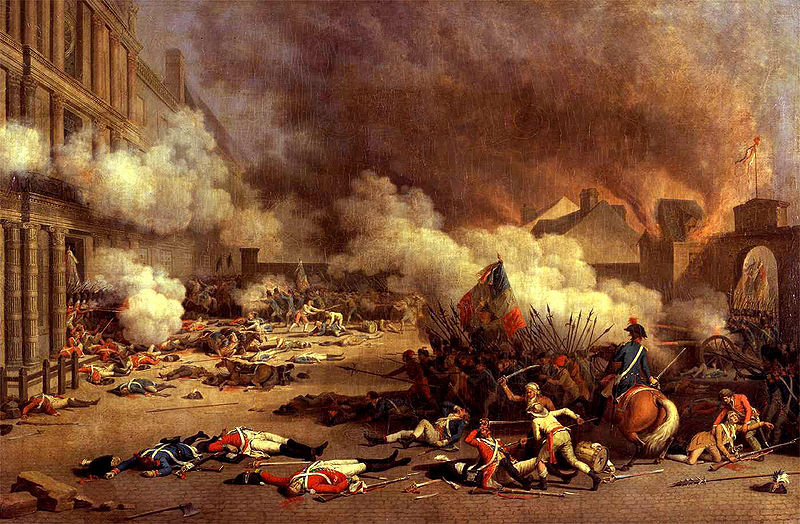 - In the end, 1043 National Guardsmen are left dead. About 150 Swiss Guards are captured, with all others being killed in the fighting. 340 Monarchist National Guardsmen are captured and put into prison for treason. The entire staff of the Tuileries Palace are killed, either in fighting or by bloodthirsty soldiers. - Archbishop Antoine-Éléonor-Léon Leclerc de Juigné of Paris is found hiding in a small study in the palace. He is led through the ashy ruin of the Palace, almost completely gutted by the fighting, to Lafayette. For “his own protection” the Bishop is given a small contingent of soldiers who watch him at all hours and advise him to remain in his home, until France stabilizes. - Prime Minister Armand is found in his office, frantically trying to grab his belongings after hearing of the assault of the Tuileries Palace. He is arrested and charged with treason, to await a trial. The Minister of the Marine, Claude Antoine de Valdec de Lessart, is not found but is suspected to be somewhere in Paris. A warrant is put out for his arrest.  -At noon after all fighting has died down around the city, General Lafayette appears on the top balcony of a building off the Avenue des Champs-Élysées. There, he tells Paris not to fear for a new order will be established soon. He decries the supposed crimes of King Louis XVI, his betrayal by not only refusing to allow our brave soldiers to restore the French nation, but his active support and aid of these Breton rebels against France. Paris must be defended from foregin elements, at all costs. He then yields to Louis Philippe, Duc d'Orléans, declared King of the French by the Jacobins, who promises Republican government and the eternal unity of the French state. He is loudly applauded by members of the carefully selected crowd, but most wealthy Parisians are in shock at the apparent collapse of France’s legitimist line. - As the newly crowned King begins to leave, a madman in the audience screams, “Pour la république!” and raises a pistol. Clearly intent on assassinating Louis Philippe, the crowd screams in terror. Danton, who is in the audience waiting for a chance to speak, jumps into action by clubbing the man in the head. The would-be assassin is incapacitated and Danton applauded for his patriotism. - Following this, Robespierre gives a speech decrying Citizen Louis Capet and his family for their crimes. Morale increases among the Jacobins and many angry citizens, but the moderates in Paris believe they have traded King Louis XVI for Dictators Robespierre and Lafayette and their puppet King. They agree the King violated the Constitution, but fear foreign reprisal by Prussia and Austria. - Montagnards within the Jacobin Party search the ruins of the King’s study and the rest of the Palace. They approach Robespierre claiming thousands of pieces of evidence indicting the King for the attempted assassination of Robespierre, incest and treason. - Robespierre contacts an ironworker in hopes of creating an artificial arm for himself. The man agrees, although it will be long and costly. The mechanical arm should be ready by this summer. - Over the next few days, members of the National Guard begin construction of barricades throughout Paris. A massive makeshift wall is erected around the city, in preparation for some attacker. The mood in Paris continues to decline as many bourgeoisie and nobility now see themselves as prisoners vulnerable to attack at any moment from the unwashed masses. Paris is now a very deadly maze. - Jacobin influence in the Revolutionary Guard grows even stronger after the events of the 2nd of May, and about a quarter of them can now be said to support the Montagnards. They call for the abolition of the monarchy, however, and see no point in trading one king for another. It is unlikely many further gains will be made until the Jacobins accomplish this. 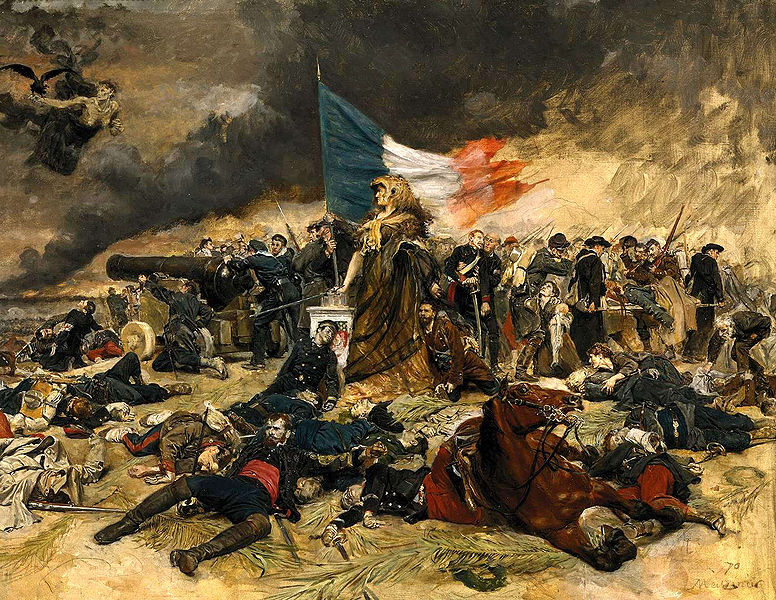 - The bulk of L’Armee du Nord leaves the border with Austria, leaving the country vulnerable to attack, and after a short march encamps outside the walls of Paris. Morale is low, and many of Rochambeau’s officers fear that their subordinates will not attack the city if given the order. They decide to wait and make attempts to starve the Jacobins out, though rumors of mutiny spread throughout the ranks. - Lafayette’s 2,000 men at the border race to the city of Nantes, where they are immediately intercepted by the marquis de la Rouërie and his men. Due to superior manpower and morale, the Bretons repulse the French over the river Loire after the comte de Rochambeau commits his forces to the field, catching the National Guard in the rear. 1425 members of the National Guard are killed by the combined forces of Comte de Rochambeau and the Breton Revolutionaries. Another 175 are captured leaving 400 to retreat. 610 Bretons are killed. The battle convinces many Bretons that the war is winnable, and they flock to the Steward’s cause, filling the Army of All Brittany with its first recruits. - Father Roux appears with Madame Gouge in several speeches across Paris. There, he commends her for her feminist attitudes. He gives all his support for her plays and attempts to drum up support for the Women’s Brigades. He calls all women, “victims of monarchy”. The popularity of Madame Gouge among the Paris working poor increases.  - Shortly afterward, Father Roux holds a recruitment drive for the Enragés. Loot stolen from the home of the Archbishop and Cathedral are used to fund the effort. It is a moderate success, with the Enragés gaining a number of frightened poor, driven by the recent coup. They are also able to make significant improvements to Father Roux’s home. Both his property’s value and morale increases! - At the end of the drive, the revolutionary priest makes a very important announcement. After much prayer, he has decided to split with the Catholic Church. No longer does it represent the congregation it claims to serve. It is a decadent shell, supportive of monarchy and vice. Although this undermines his popularity somewhat, with more religious members leaving the Enragés, most other members of the group leave the Church themselves establishing a small “People’s Catholic Church” with Roux at the head. The Pope issues an official excommunication shortly thereafter. - A series of pamphlets entitled, “The Revolution is in Danger” are released to much fanfare by Enragés. They claim Breton seperatism, support for said seperatism amongst the military and the monarchists, and Austro-Prussian antagonism, the ideals of libertie, egalite, and unite are under attack, and in danger of dying out entirely. The pamphlets are later translated and published in the United States, where they gain significant approval from Anti-Federalists. - Reorganization of the Revolutionary Guard is begun by Babeuf. He institutes a meritocratic system of officers, where soldiers elect who they serve under. The worth of this reform has not been tested although some believe it will result in massive corruption. - Late in May, Babeuf makes a powerful speech demanding the peasantry of France look to Picardie and rise up. He calls for the total abolition of private property and the collectivization of all wealth. Several estates in the French countryside, abandoned by their nobles, rise up and enact Babeuf’s demands. These areas remain the exception rather than the rule, however, and with each castle they take the revenue of the French government decreases. - The Enragés are moved farther left thanks to a concerted effort by Babeuf and Roux. The group now meets in the streets of Paris, demanding the immediate dissolution of the state, death to all conservatives and reactionaries, and the collectivization of property. The bourgeoisie make a mental note to purchase larger locks.  - The Army of the Rhine begins training their troops, if only in preparation for an assault by the Holy Roman Empire. Knowing they lack numbers to fight all of Europe, they adopt a much more unconventional approach, based on Francis Marion's army in the American Revolutionary War. Results are mixed, with most soldiers unfamiliar or resistant to the new organization. - Construction for the Army of the Rhine’s headquarters begins. It is being built Strasbourg and expected to be done by the following Spring, should nothing happen to interrupt construction. - In the meanwhile, Alexis Le Veneur de Tilleres invites a number of stage troupes to his training camps to keep up morale among his elite forces. It is an odd proposal, but heartily enjoyed. Unlike some other commanders, Alexis is a popular man in his army. - Paris teeters on its Orleanist king, with most in the Jacobin Club now openly calling for a republic and moderate monarchists completely divided on whom to support. No one knows which faction will succeed, but one thing is certain: as goes Paris, so goes the nation. COLONIAL NEWS: - Napoleon arrives in Saint-Dominigue to significant fanfare, with Toussaint personally welcoming the young Corsican to his island. All sides appear happy for an ending to the Haitian rebellion, a silly affair in hindsight. With the promise of Saint-Dominigue being integrated into Metropolitan France, all hostilities seem to have subsided. Festivities end abruptly, however, when news of the ‘Haitian Curse’ surfaces. According to legend, Hispaniola's native inhabitants placed a curse upon the land when Western explorers slaughtered their people. Now, every new moon the dead of Saint-Dominigue rise up, to claim their vengeance on the French settlers. Napoleon dismisses the legend out of hand, but stations six thousand men in various forts along the border just in case. 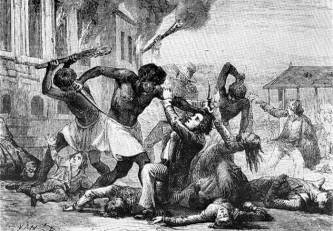 - The following week, as the island is pitched in darkness, tensions are running high in the newly arrived French garrison. Although the border fortifications are strong, there is no telling how effective they will be against these rumored agents of Satan. Their fears are realized when 900 undead warriors suddenly converge on one of the undermanned border fortresses, slaughtering all but thirteen members of the garrison within. They are lead by a skullfaced demon, calling himself Baron Samedi who declares, "I am Baron Samedi, Loa of the Dead, Lord of the Cemetery, and God of your destructions. My wrath is upon your heads. Prepare to meet your ancestors." These soldiers arrive in Le Cap a few days later, terrified and warning the leaders there to abandon the island. - Napoleon, however, is unfazed and sends a special team of French investigators to solve the case. Using their quick wit and a dog named Dieu, the group tracks down the zombie hideout. Inspector Samuel Chastain Rogers orchestrates an elaborate trap for the monsters, capturing one undead and bringing him back to Napoleon himself. There, the fiend is unmasked and revealed to be a Haitian rebel working directly for Toussaint, who wanted to scare the French off the island. The entire operation is blown! Toussaint would have gotten away with his operation if it weren’t for those meddling investigators and their stupid dog! - Undeterred by this humiliating failure, Toussaint relocates a majority of his troops and the recent graduates of the Cabre House to Le Cap in preparation for further military maneuvers. His followers send messages into French territory, telling the former slaves there to rise up and march north. Many do, but are met with resistance by France’s border fortifications. A trickle arrives through the base attacked by Baron Samedi’s forces. 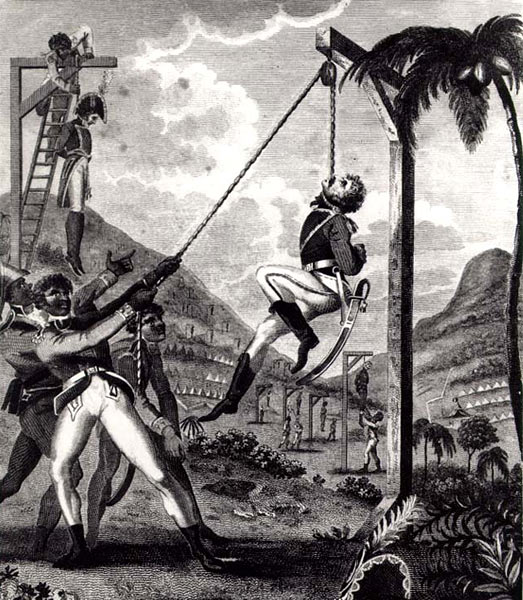 - The property of fled or deceased whites is distributed to their former slavehands. This proves monumentally popular and the economic situation in Saint-Dominigue sees a boon. The rebels are able to work the land and pay for aid given by Britain and Spain, prompting further investment for both countries, but trade with the French mainland completely stops, ending tariff collection on sugar. - Meanwhile, a letter is sent to the Legislative Assembly from Toussaint himself. It states that, unless the French Army leaves immediately, Saint-Dominigue will be at perpetual war with the Kingdom of the French. Napoleon is also sent a letter, this one just being a crude drawing of an ass and some genitals. - Napoleon takes six thousand men and begins to march north, to Cap Français. They are forced to stop at the border, when they come under immediate attack by Haitian guerrilla forces. Faced with this failure, Napoleon immediately marches back south and engages in a vigorous training campaign. At the end of three weeks, the skill of his forces has improved but they are utterly exhausted by Napoleon’s seemingly infinite energy. Morale decreases slightly. BRETON NEWS: - Command of the Ar Diebiñ Bretoned is handed over to Georges Cadoudal, with attempts to transform it into an elite fighting force composed of only the best trained and best armed Bretons. The marquis de la Rouërie forms the Army of All Brittany, to function as a standing army for the nation. Sharpshooters, armed and equipped with experimental new “rifles” from England, become particularly well known. The public in the area call them the “Ermine Coats”. - “An Open Book: The Collected Writings of Steward Charles Armand Tuffin, marquis de la Rouerie” is published from a printing house in London. It sees some popularity, especially in the Vendee and Brittany, where Cadoudal’s distribution network turns it into an overnight success, but despite Tuffin’s best efforts the royalties are not enough to cause any lasting relief of the famine. - An alarc'h becomes a common marching song in the Army of All Brittany, and soon - with popular momentum - is declared the Duchy’s national anthem, with the old and ancient flag restored not long after. - Marie Thérèse arrives at Rennes scared, but otherwise unharmed. The young girl is ushered in to see Georges Cadoudal, who she tells everything. Brittany’s heart goes out to the confused princess. - The Order of the Ermine is restored in Brittany, to be issued by the steward of the throne in the name of His Highness Duke Louis II. Both the steward and the throne and Georges Cadoudal are among the first recipients of the higher, noble brand of the award. - Breiz Atao, a new paper in favor of Breton separatism, monarchism, and conservatism is established with Cadoudal and Tuffin as its editors. It sees most of its readership among the ethnic Breton aristocracy and the middle-class, with most peasants too illiterate to read the material. Some sympathetic Frenchmen take to reading the paper, which establishes a reputation for being more royalist than many royalists in France. FOREIGN NEWS: - The Kingdom of Great Britain grants official recognition to the Bretons, as do the Prince-Bishopric of Liège and the Papal States. Other powers are more reserved, preferring to wait and see how things go before wasting prestige on a rebel movement that might end in under a year. - Despite pressure from William Short, the Washington administration refuses to recognize Brittany. Even Thomas Jefferson refuses the ambassador’s council on this matter, advocating a strong France as a counterbalance to Great Britain. - Citing a desire to retire to his estate, George Washington announces he will not run for a second term in office, hoping to establish a precedent. He is applauded as a modern day Cincinnatus. Both Jefferson and Hamilton immediately announce their candidacies for the presidency, with Madison and Clinton as their respective vice presidents. John Adams is looked to as a possible third option. - After openly swearing the oath presented him by the monarchists within France, the comte de Provence rallies more men to his cause, primarily soldiers from the Netherlands and emigres fleeing the disastrously high taxes on land and estates in France. - Prussian arms dealers formalize contracts with the Regency, allowing a steady stream of supplies to filter into the army camps outside of Brussels. The equipment is of the highest quality and comes at great expense. - French diplomats yet again try to smooth relations with the Emperor, but are completely undermined by both the revolt in Paris and a sudden new arrival to the Emperor’s court. Louis Stanislas, comte de Provence, enters with much fanfare and addresses the gathered nobility and rulers, stressing that the king’s life is in immediate danger, inviting the young Dauphin out to stand with him. As silence fills the chambers, he reads aloud from the headlines of the more radical Jacobin newspapers. Suddenly, Prince Francis rises, and declares that he shall lead an army to destroy the revolution and the traitors who have brought it about. Though the Austrians issue no formal declaration of war, most citizens in France believe it is imminent, and as panic spreads their voice is clear. France must strike first! - Robert Bakewell is invited to France by Babeuf, but is forced to politely decline after receiving word of France’s increasing instability.
|
| # ? Nov 18, 2012 04:51 |
|
La Nation, la Loi, le Roi- A France NationSim Country: Royaume des Français (Kingdom of the French), established 3 September 1791 by the ratification of the French Constitution by King Louis XVI Foreign Relations: Somewhat good relations with the United States of America, remarkably bad relations with the Kingdom of Prussia and the Holy Roman Emperor, extremely poor relations with the Kingdom of Great Britain. Declaration of Pillnitz by Austria and Prussia a standing issue. The Empire is mobilizing for war. Population: 28,000,000 Year: Summer 1792 (turns represent 3 month seasonal cycles) Metropolitan France  Paris 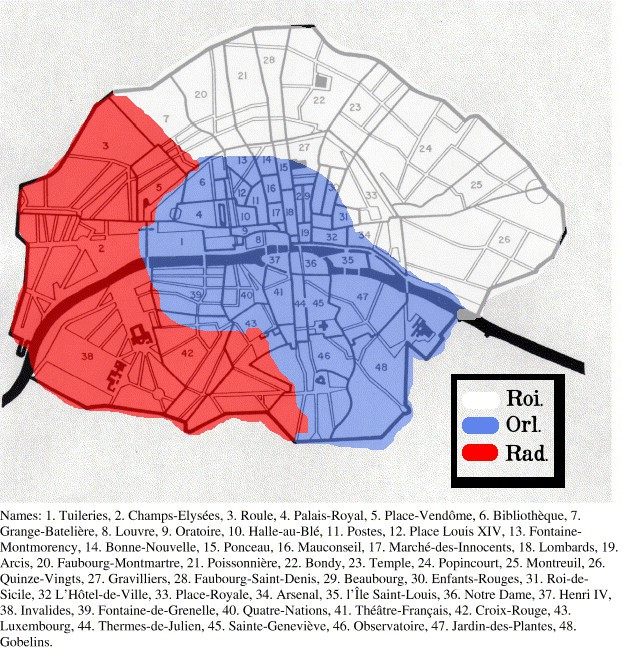 Saint-Domingue 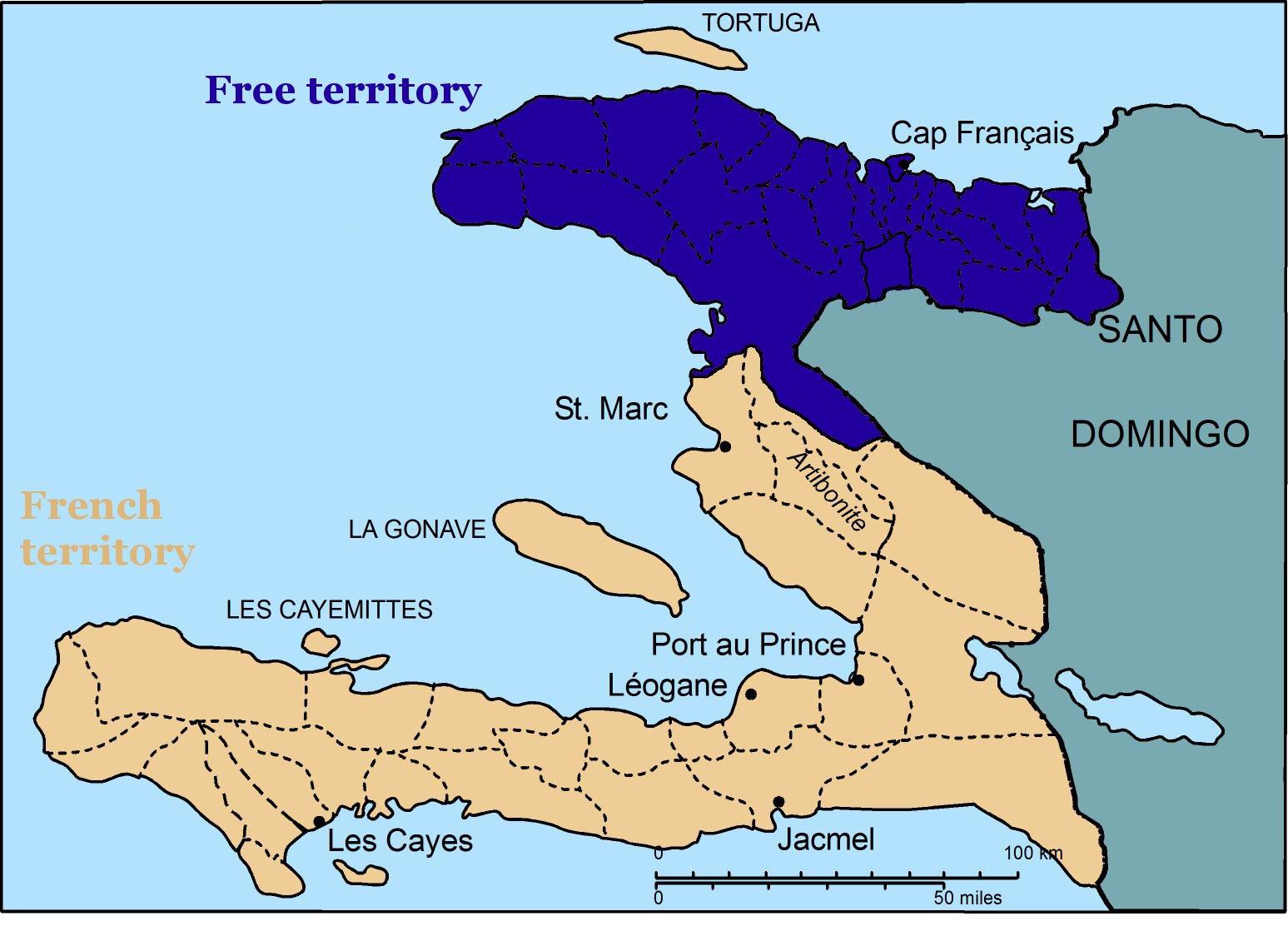 =Economy= - =Economic Sectors= Agriculture: 83% Manufacturing: 7% Trade: 10% Growth Rate: -3% = Unemployment: 24% =Government=  The Constitution of 1791 severely limited the nobility's authority. The King reserved some rights, such as the royal veto, but the ability to exercise this right seriously undermined the King's popularity in government. The writers of the Constitution struggled to balance royal power with popular sovereignty. - Popularity: Somewhat Poor System: Unitary Constitutional Monarchy  179x250 Legitimist King: Louis XVI de Bourbon/Gantolandon (gantolandonsa@gmail.com)
Supporters: Nobility, Emigres, Moderates Laws of Succession: Agnatic Primogeniture Heir Apparent: Dauphin Louis-Charles de Bourbon (Age 7) (unplayable, in Vienna)  221x250 Orleanist King: Louis Philippe I, “Citoyen Egalité”,Colonel Wood (sacolonel.wood at gmail.com)
Supporters: Petit bourgeoisie, Jacobins Laws of Succession: Agnatic Primogeniture Heir Apparent: Prince-Royale Louis Philippe de Bourbon (Age 19)/vacant  188x250 Emergency President of the Legislature: Maximilien de Robespierre/sniper4625 Legislative Assembly: 745 Seats (166 Feuillants, 333 Jacobins, 245 Independents, 1 Enragé) Elections: Members of the Legislative Assembly are elected every two years. 247 are chosen from each department, 249 are elected nationally and 249 are chosen on the basis of tax revenue. Suffrage: All men who pay annual taxes equal to or greater than the local wages paid for three days of labor, over the age of 25. Soldiers are exempt from all requirements but age after two years service. For National Guardsmen, similarly, but six years service. LEGISLATIVE ASSEMBLY DISBANDED UNTIL FURTHER NOTICE. ALL REPRESENTATIVES ARE COMMANDED TO RETURN HOME BY ORDER OF THE PRESIDENT =Cabinet= The choice and dismissal of Ministers appertains solely to the King. The members of the Legislative Assembly may not be appointed. All powers exercised by the King must be signed by at least one minister before it can take effect. Most minister’s executive privileges have been temporarily suspended. 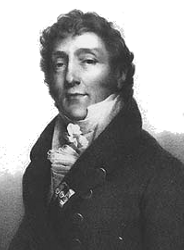 184x250 Minister of Foreign Affairs: Armand Marc, comte de Montmorin/Rincewind (blriley@gmail.com) (CAPTURED!) The Minister of Foreign Relations is tasked with maintaining relations with foreign nations and the protection of French citizens abroad. He is nominally considered to be the Prime Minister. 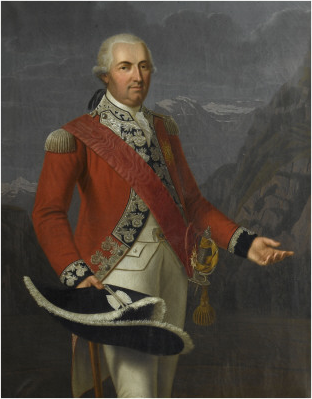 312x399 Minister of War: Karl Josef von Bachmann/Enjoy (sw_faulty at hotmail dot com) The Minister of War has total control over the French Army and is responsible for the protection of French border provinces. Given international hostility toward France, the execution of this duty may be difficult. 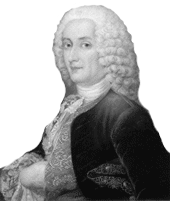 170x201 Minister of the Marine: Claude Antoine de Valdec de Lessart/Brillo_Pad (tripleultima@gmail.com) (IN HIDING!) The Minister of the Marine has jurisdiction over all seafaring French vessels and the colonial territories. It is his duty to ensure the protection of trade.  215x292 Minister of Justice: Marguerite-Louis-François Duport-Dutertre/ZearothK (zearothk@trioptimum.com) The Minister of Justice is responsible for all judicial affairs within France and ensuring the rule of law is maintained. Due to the chaotic nature of French internal affairs, the Minister will have to balance the orders of the King and Legislative Assembly.  219x283 Controller-General of Finances: Jacques Pierre Brissot/Freudian (i.bindley at g-mail). The Controller-General is charged with maintaining state finances, agriculture, industry, commerce, roads and estates. Due to the poor state of the French economy, the position is in a state of turmoil and officials here rarely last long. =Factions= 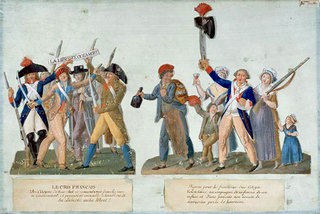 320x214 - Club des Feuillants  184x250 Constitutionalist, led by Armand Marc, comte de Montmorin/Rincewind (blriley@gmail.com) (CAPTURED!) The Feuillants are considered the ‘moderates’ of the French Revolution. These officials believe in the preservation of the monarchy in its current limited form and promote decentralization. Many of these men fear reprisals because of the May Revolution, and others lend their support hesitantly to King Louis Philippe. Their headquarters is located in a former monastery on the Rue Saint-Honoré in Paris. Represented by the colour blue. - Club des Jacobins  188x250  219x283 Radical Republican (Montagnard) wing led by Maximilien de Robespierre/sniper4625. Liberal Republican (Girondin) wing led by Jacques Pierre Brissot/Freudian (i.bindley at g-mail). The faction is roughly evenly split. The Jacobins are the radicals of the French Revolution who want the complete dissolution of the monarchy and to further centralize the French government. The two wings of the Jacobin Club continue their struggle, but most members now agree that a Republic is the best solution. Their headquarters is located in a former convent on the Rue St. Jacques in Paris. Represented by the colour red. - Parti Orléanist  490x346 Revolutionary Monarchist, led by Prince-Royale Louis Philippe de Bourbon/vacant The Orléanists believe that by leaving the country, all of the emigres forfeited their rights to the crown under the constitution. Louis XVI is held to have abdicated immediately upon vetoing the Brittany Act. This makes Louis Philippe I the rightful King of the French. They draw many of their supporters from members of the Feuillant and Girondist clubs, and though a very young and weak party, the current political instability gives them chance to change that. - Monarchistes Français  194x250 Reactionary Monarchist, led by Georges Cadoudal/Arujei (rjohnlennon@gmail.com) Although they are not represented in the Legislative Assembly, this group represents an alliance between members of the former aristocracy, who wish to see a return of the absolute monarchy and landed aristocracy, and marginalized minorities like the Bretons who chafe under the centralization of the state. Although many fled following the ratification of the Constitution, those who remain in France have strong funding from outside parties. Both Jacobins and Feuillants are terrified of these émigrés because of their ability to influence French politics. - Les Enragés  236x302  496x514 Babeufist (Populist Left), led by François-Noël Babeuf/A RICH WHITE MAN/(moodinconsistency at gmail) and Jacques Roux/Stalingrad (stalingradlenin@gmail.com) The crippling bread prices and a general lack of work in Paris have given some popular support to a movement that might otherwise have been a footnote of history. Even further to the left than the Jacobins, the Enragés rely on the support of the common man and encourage a thoroughly radical revolution. Departments: Following the ratification of the French constitution, the provinces of France were destroyed and the lands of the aristocracy dissolved. In their place, the Legislative Assembly established 82 departments. Each department is ruled by an Administrator and receives three representatives in the Legislative Assembly, except Paris which receives only one. =Newspapers= L'Ami de la France (CLOSED) Editor: Comte de Montmorin Ideology: Constitutionalist Readership: mostly in larger cities - Paris, Lyon, and Marseille especially. Widely read by the middle class, some readers in the aristocracy. Headlines: “...” L’Ami du Peuple  200x246 Editor: Jean-Paul Marat/pattersongsa@gmail.com and Saint-Just Ideology: Radical Republican Readership: Middle class exclusively. Headlines: “ON THE FREEDOM OF THE NEGRO, AND WHY IT MUST WAIT”, “THE TRAITOROUS BRETON HORDE WILL MAKE FOR EXCELLENT PRACTICE”, “THE GERMAN AND THE BRETON, THE TWO ENEMIES OF FRANCE” Le Libertin (OUTDATED) 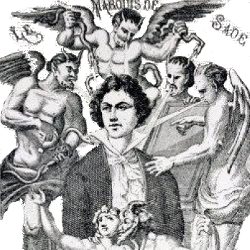 250x250 Editor: Donatien Alphonse François, Marquis de Sade/Fall Sick and Die (ccferrara@gmail.com) Ideology: Radical Republican Readership: the petit bourgeoisie and urban laborers. Read almost exclusively in Paris. Headlines: "THE UPRIGHT BRETON LAND APE: A BIOLOGICAL PROFILE" "WHY THE KING WILL NEVER BE ARRESTED: AN INCORRECT OPINION" "BRITTANY COVERED IN SEAMEN: THE CAMPAIGN DIARIES OF MARQUIS DE SADE" "SALON MISTRESS CLAIMS THE KING IS NO MAN AT ALL: OUR SECRET EUNUCH KING?" Le Père Duchesne  438x600 Editor: Jacques Herbert/SexyBlindfold (estafortaleza (at) gmail (dot) com) Ideology: Radical Republican Readership: Urban poor, Parisian lower class Headlines: “R IS FOR REVOLUTION: HOW TO KILL A KING” “THE REAL STORY OF THE MAY REVOLUTION” Breiz Atao Editors: Georges Cadoudal and Armand Tuffin Ideology: Breton Nationalism Readership: Bretons, aristocracy, some supporters in France Headlines: “OUR DECLARATION OF INDEPENDENCE”, “ARMY OF ALL BRITTANY FORMED – ARE YOU READY TO FIGHT FOR YOUR DUKE AND DUCHY?”, “SADE AND ROBESPIERRE - BROTHERS IN HATE”, “WHY WON’T FRANCE ACCEPT US?”, “FRENCH SECTION: AN APPEAL TO REASON AND LIBERTY”. =Military= 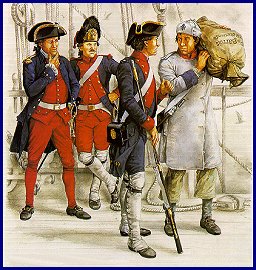 256x270 The reformed French military in 1791 required well-trained officers, disciplined soldiers and freethinking non-commissioned officers. Due to the collapse of the nobility, of which the army had been dependent on, the French military lacked all three of these qualities. The result was a poorly organized, poorly disciplined fighting force. 1792 Reglement 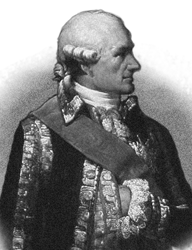 192x250 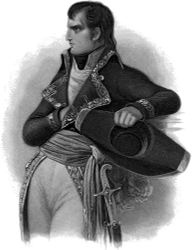 194x250  196x250 Maréchal de France: Jean-Baptiste Donatien de Vimeur, Comte de Rochambeau/stalin-chan (stalin@c0balt.com) Forces: 94,250 soldiers, 11,000 cavaliers, 290 cannons Organization: 2 corps, 10 brigades, 50 regiments, 500 companies --- l’Armée du Nord [assigned 30000 soldiers. encamped outside of Paris. commanded by Jean-Baptiste Donatien de Vimeur, Comte de Rochambeau/stalin-chan (stalin@c0balt.com)] ------3e Brigade d’Infanterie [assigned 7500 soldiers. 1000 in Normandy searching for de Sade, 6500 at the Breton border] --- l'Armée du Rhin [assigned 37500 soldiers. stationed by the bank of the Rhine. commanded by Alexis Le Veneur de Tillières/AndItsAllGone (anditsallgone@gmail.com)] --- l’Armée Expéditionnaire [assigned 8725 soldiers, 30 cannons. stationed in St. Marc. commanded by Napoléon Bonaparte/YF-23 (yfaltmiau at hotmail dot com)] Situation: Low morale, newly implemented army structure untried and causing disconcertion in the ranks Volunteer regiments suffer from a complete lack of training and discipline. Rate of recruitment increased thanks to Suffrage Act. French Navy  300x329 Admiral: Joachim Murat/vacant Forces: 71 ships of the line, 61 frigates, 45 corvettes, sizable merchant marine Organization: 2 fleets, several smaller patrols --- Flotte de l’Atlantique [assigned 40 ships of the line, 30 frigates. Blockading Brittany. commanded by Louis Thomas Villaret de Joyeus/vacant] --- Flotte de la Méditerranée [assigned 31 ships of the line, 26 frigates. based in Toulon. commanded by Louis-Armand de Rohan Constantine/vacant] Situation: New command structure, many remaining officers skeptical. Many vessels in disrepair. Swiss Guard  276x250 Oberst: Major Karl Josef von Bachmann/Enjoy (sw_faulty at hotmail dot com) Forces: 130 guardsmen (in prison), 100 guardsmen in Austria Situation: Highly trained, highly effective mercenaries serving as the King’s personal guards. Their forces were recently shattered by the National Guard in an assault on the Royal Palace. The Swiss government is outraged by the slaughter of their citizens and struggling on how to respond. National Guard  246x250 Commander-in-Chief: Gilbert du Motier, Marquis de Lafayette/ a bad enough dude (ehoovestol@gmail.com) Forces: 41,032 National Guardsmen, 12 American advisors, 12 cannons Situation: Mediocre morale after slaughtering their own brothers, and poorly organized. Training is underway and discipline steadily improving. Recruits are drawn mostly from the middle class, with some among the poor. =Foreign Threats=  416x599 L’Armée des Princes Commander: Louis Stanislas Xavier, Regent of France and Navarre Sponsors: Kingdom of Prussia Forces: 3400 infantrymen and two squadrons of hussars Situation: Recruiting in Brussels. Excellent training, decent morale. Hussars and infantry are well-armed. =Rebellions and Militias= Ar Diebiñ Bretoned Leader: Georges Cadoudal Ideology: Breton Nationalism / Conservatism Popularity: 35% in Brittany Forces: 3890 peasants, 40 noblemen Situation: Recently distributed muskets and farming instruments. Aid from unknown source has stopped due to blockade. Some training. Great morale. La Garde Révolutionnaire Leader: François-Noël Babeuf Commanders: Hidden Commander/? Ideology: Babeufism / Women’s Liberation Loyalties: Mostly Enragés, with some Jacobin sympathies Popularity: 5% in Paris Forces: 1100 sans-culottes, 450 “working women” Situation: Volunteer militia formed after the March on the Champs-Élysées, made up of disenfranchised peasants and artisans. Recently formed women’s brigade attracting feminists. No training, decent morale. La Garde Libre/The Cambions Commander: Marquis de Sade Ideology: Far Left/Anarchism Popularity: 2% in Paris Forces: Unknown Situation: Volunteer militia recruiting in northern France, supplemented by mercenaries and press-ganged men, with a small group of ships for transport. Poorly trained, decent morale. The people of France are terrified of the Marquis's inevitable return to Paris and have taken their security into their own hands. Receiving arms from unknown source. Haitian Slave Revolt Leaders: Several, in disarray  230x250 Commander: Toussaint Louverture/EccoRaven Ideology: Abolitionist Popularity: 85% among black Haitians, no support in Metropolitan France Forces: 31,000 slaves, 3 cannons, 1 mortar Situation: Morale is very high, training is poor but improving. Occupying most of northern Saint-Domingue and sporadically attacking the whites there. Receiving arms and supplies from the Spanish and British. Other Important Individuals and Groups: Archdiocese of Paris With the confiscation of church property and the subjugation of the clergy to the state, the influence of the church hierarchy on France is theoretically minimal at best. In reality, however, many voiceless Catholics still place their church first, and no one is in so good a position to take advantage of that trust as the Archbishop of Paris.  173x250 Archbishop: Antoine-Éléonor-Léon Leclerc de Juigné/Cozy Hemp Mines (Cozyhempmines at googlemail) American Embassy to France Although he may not wield significant power on the European stage, the American ambassador and his government serve as symbols of democracy and republicanism. 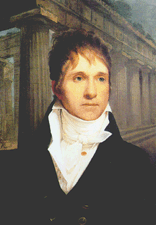 Ambassador: William Short/Tao Jones (sa.taojones at gmail) British Embassy to France Along with setting British foreign policy concerning France, the current ambassador also has a vast amount of personal wealth to draw upon.  191x250 Ambassador: Duke George Leveson-Gower/Incy (incysa at gmail) Prussian Embassy to France The Prussian ambassador is among the most virulent of enemies of the French state.  191x250 Ambassador: Friedrich-Wilhelm von Franco/Ramba Ral  219x250 Charles Hector, comte d'Estaing/tatankatonk (tatankatonk22@gmail.com) No longer admiral of the French Navy, what role will this man serve in France’s future? His history as both a radical feminist and a monarchist make him quite unpredictable. 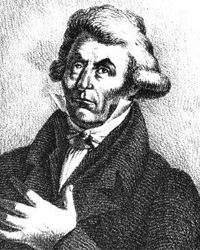 200x250 Alexis-Vincent-Charles Berbiguier de Terre-Neuve du Thym/Sword of Damocles (praeaton@gmail.com) A “demonologist”, this man has recently been seen in the company of the Swiss Guards.  216x268 Marie Gouze/Maxico Roberto (maximo . roboto on Gchat) Although initially in support of the Revolution, Marie Gouze was disenchanted when she learned women would not be allowed to participate. She is an influential writer in Paris but extremely controversial. 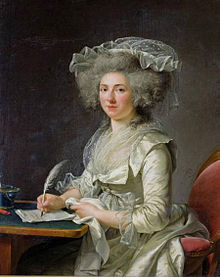 220x277 Madame Roland/vacant The wife of noted Jacobin Jean-Marie Roland, the Madame exerts a great deal of influence over her husband and through him the members of the Legislative Assembly.  237x250 Louis Antoine de Saint-Just/Epicurius (epicurius at aol.com) Louis is a young, up and coming star within the Jacobins. He has publicly called for the execution of all monarchs, a terrifying idea for most of France.  245x250 Charles Maurice de Talleyrand-Périgord/Götterdämmerung (wafflepoet at gmail dot com) Charles Maurice is a member of the minor aristocracy in France but has devoted his life to far more revolutionary ideals. He participated in the writing of the Declaration of the Rights of Man and proposed the Civil Constitution of the Clergy.  183x250 Louis Stanislas Xavier, comte de Provence/Takanago (ktakanago@gmail.com) The younger brother of the King of the French and the de facto leader of the émigrés outside France. His recent declaration of regency is a threat to the stability of the country and is currently recognized by the Kingdom of Prussia. =Stats=  Agriculture: Undercapitalized with below average average crop yields. Poor harvests have lead to unfavorable conditions for local markets. Situation improving. Industry:: Mostly textiles, with some mining and metalworking. Stabilized somewhat by ample subsidies and an influx of cotton from America. American markets also proving quite amenable to French manufactures. New projects in the Rhine under construction. Food: Mild famine has resulted in a massive spike in prices but agricultural investments have resulted in a minor improvement in diet. Brittany is struggling heavily but surviving. Nobility and bourgeois eat well. Labor: No restrictions on working hours or hiring practices Education: 45% literacy for men, 32% for women. Based on the apprenticeship system, with Catholic seminaries being used as an alternative for poor families. Some seminaries expanding admission thanks to education budget increases. Private tutors used for nobility. Public Health: Major cities contain small sewers but require updated water systems. Health care largely provided by the clergy, who now receive funds from the state for that purpose. Crime: Approximately 3,660 officers are used to defend strategic sites like the palace, royal mint and major roadways. Well-organized and trained but corrupt. Trade: France receives a large influx of goods from her colonies. However, her exports have fallen out of favor within Europe itself. America recently established as trade partner. Colonies: Mostly in the Caribbean and India, holdovers from numerous unsuccessful wars against Britain. Slavery is widespread and forms the lifeblood of the overseas economy. Compromise with Toussaint a complete failure, sugar trade has been diverted to England and colony likely to rebel again. Finance: Assignats have largely replaced the livre as the de facto currency of France. Inflation steadily increasing thanks to Robespierre’s budget. Urbanization: Less than a quarter live in cities. Population growth primarily in rural areas. Religion: Catholics dominate political life but Calvinists and Jews are tolerated. The Civil Constitution of the Clergy makes priests direct employees of the state. Ethnic Groups: 53% French, 46% Occitan, 1% Corsican. Official toleration of local languages but increasing momentum towards French as the sole language of the state. =Budget= Due to the poor economic policies of the monarchy, the treasury of France was bankrupt by the time the Constitution was enacted. In order to ensure economic stability, church property was forcibly seized and used as a standard for the currency. Despite the decrease in royal power, a large portion of the yearly budget was used to build and maintain the property of the nobility. As a consequence of underfunding the police and low accountability among tax collectors, Revolutionary France often had difficulties collecting taxes. quote:Contributions Directes:
|
| # ? Nov 18, 2012 04:51 |
|
Kentoc'h mervet eget am zoatran- A  Country: Ar Dizalcʼh Votadeg Dugelezh Breizh (The Independent Elective Duchy of Brittany), established 8 November 1791 by the ratification of the signing of the Breton Declaration of Independence Foreign Relations: Excellent relations with the United Kingdom, good relations with the Papal States, good relations with Prince-Bishopric of Liège, neutral relations with the United States, at war with the Kingdom of the French Population: 1,680,000 Year: Summer 1792 (turns represent 3 month seasonal cycles) Metropolitan Brittany 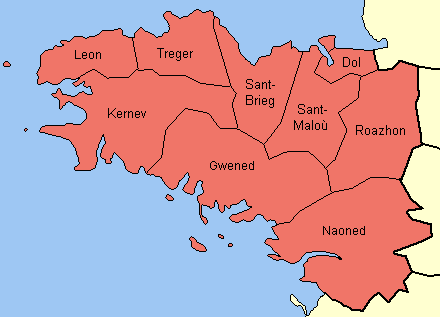 =Economy= - =Economic Sectors= Agriculture: 88% Manufacturing: 12% Trade: 0% Growth Rate: -1% = Unemployment: 17% =Government=  Popularity: Good System: Feudal Elective Duchy  179x250 Duke: Luis II de Bourbon/Gantolandon (gantolandonsa@gmail.com)
Laws of Succession: Agnatic-Cognatic Elective Heir Apparent: To be decided. Noble Assembly: 145 Seats (100 Nobles, 45 Clergy) Popularity: Somewhat Low Steward of the Throne: Charles Armand Tuffin, marquis de la Rouerie/Gorgo Primus Elections: No elections held. Suffrage: None at the national level. Nobles cast votes for Duke upon the death of the preceding Duke. =Cabinet= There are no rules dictating members of the Stewards cabinet due to the ongoing conflict and lack of a constitution. Brittany’s fate lies in the hands of a few individuals hand-picked by Tuffin.  194x250 Chancellor: Georges Cadoudal/Arujei (rjohnlennon@gmail.com) No duties specified. =Stats=  Agriculture: Farm focused economy, but a lack of imports or exports has resulted in underproduction. Industry:: Exclusively textiles. It is not clear whether Brittany qualifies for the Free Trade Compact with the US, as such rates of sale tends to vary drastically Food: Starvation is setting in for Brittany. Labor: No restrictions on working hours or hiring practices Education: 38% literacy for men, 27% for women. Based on the apprenticeship system, with Catholic seminaries being used as an alternative for poor families. Private tutors used for nobility. Public Health: Major cities contain small sewers but require updated water systems. Crime: No system in place for targeting crime. Remnants of the old French system still in place but not functioning Trade: Only trade on the local level thanks to French naval blockade. Colonies: None Finance: Assignats have largely replaced the livre as the de facto currency of Brittany. Urbanization: Less than a fifth live in cities. Population growth primarily in rural areas. Religion: Catholics dominate political life. Religion reasserting authority under Breton homerule. Ethnic Groups: Mostly Breton, with Frenchmen clustered on the border. Sporadic attacks occurring on French speakers in the region. =Military= Army of All Brittany  177x250 General: Charles Armand Tuffin, marquis de la Rouerie/Gorgo Primus Forces: 6,000 soldiers, 300 cavaliers Organization: None Situation: Border patrol along the Loire and up through Normandy. Numbers seem to increase with each victorious battle. Good morale, very poorly trained. About half of the men have arms fitting their duties. Sharpshooter regiment has experimental new rifles. =Budget= quote:Contributions Directes:
|
| # ? Nov 18, 2012 04:51 |
|
 Marquis de Lafayette, Commander of the National Guard From speech to Paris; Citizens of France, the traitorous Louis Capet has been removed from power, and now we embrace a great King worthy of his people! Vive la liberté! Vive Louis Philippe I! Vive la France! Not only did citizen Capet violate the Constitution numerous times, but he concocted to shatter France herself in a futile attempt to restore the ancien regime of nobel and peasant, of autocracy and oppression. Yet the people have beautifully risen against this plot to crush our revolution. France has emerged the victor, and history will remember this day for as long as man lives free! I admit, I never wished for these turn of events. I had hoped the former King would respect his constitutional obligations as sovereign, entrusted with the faith and hopes of all Frenchmen. Yet he has not and instead conspired illegally to break our great country into a thousand parts. Divide and conquer was his strategy to restore tyranny, with no shred of compassion for his people. So the National Guard, with the aid of many brave and patriotic men, has restored true government to France. I salute the heroic Guardsmen and citizens of Paris who gave their lives for this day! Louis Philippe I is a true King, and he shall stand at the helm of an undivided and glorious France, where Liberty and Justice prevail. This nation and our benevolent monarchy will serve as an inspiration to all Races, so that they may one day throw off their own petty Tyrants. Now it is war. All patriots of France, I ask you to march with me, with Louis Philippe I, with Liberté and with Unité to defeat those who would dishonor our great nation!
|
| # ? Nov 18, 2012 05:08 |
|
 The Speech posted:People of Paris, san-cullotte and shopkeep, we are in a time of the greatest crisis. Louis XVI, the man who proclaims himself to be your king, has spent the past nine months working against you, working against the Constitution, working against France! Let us recount his crimes: Speech upon the success of the Revolution of '92 posted:It now falls to us to rebuild our state. While we may have a King, the power is now and forever more with the people. We will build upon this. First to deal with the traitors. Brittany can be left to rot behind the wooden walls of our barricades and the fleet. Europe looms!
|
| # ? Nov 18, 2012 05:14 |
|
 Steward Charles Armand Tuffin, marquis de la Rouerie Steward of the Throne of the Elective Duchy of Breizh/Brittany for Duke Luis II Excerpt From A Speech to the Nation posted:... and so we sent letter after letter to the government of France. I sent letter after letter to the government of France. Each and every one was formal, polite, kind, and clear. We asked for peace and understanding, offered alliance and trade. Instead they ignored every. Single. One. And then invaded us with an army. And now they attempt to starve us all to death yet anew!
|
| # ? Nov 18, 2012 05:47 |
|
I heard Robespierre thought his arm was counter revolutionary and had it cut off.
|
| # ? Nov 18, 2012 05:52 |
|
 Memorandum posted:To: Whoever is in charge anymore, I don't even know
|
| # ? Nov 18, 2012 05:54 |
|
 King Louis Philippe I People of France, my first acts as King is to proposeModification to the Royal Veto where the Royal Veto can be overturned by a 2/3 approval from the Legislature and I retain the right to have a line item veto.
|
| # ? Nov 18, 2012 06:08 |
|
   Louis Stanislas Xavier, comte de Provence, Commander of L’Armée des Princes, Regent of the Kingdom of France and Navarre, acting in lieu of His Most Christian Majesty The King, Louis XVI Our enemies not just only try to remove my brother from my throne but they attempt to install a foolish pretender upon it as well! This is much more than just a foul power-grab, more than just a traitorous bloodbath. This is an insult to my family! Louis Philippe! Know that there are so many more men who deserve to sit on the throne of France and Navarre than you! But, of course, lets not forget the other important things at stake here. L’Armée des Princes and I fight to protect my brother, Louis XVI, his family, and France itself! As expected, the first blow in this latest revolution was not struck by us, but by filthy, bloodthirsty radicals! It will not be they who strike the last. Not only does L’Armée des Princes stand ready to fight, but so do the armies of Brittany, Austria, and Prussia! Goodhearted men of all social classes understand what is at stake here, and they are willing to sacrifice their lives for it. As I swore not just too long ago, I will do everything within my power to protect my brother, the king, and everything he stands for. As soon as we are ready, we and our allies will march towards war. For justice! For France! For Louis XVI!
|
| # ? Nov 18, 2012 06:19 |
|
 France stood at the threshold of a glorious new age. An age of rational government, where the rule of law and adherence to the Constitution would reign throughout the land, where a wise king and a deliberative Assembly would share the burdens of state, and diplomacy and debate replaced muskets and cannons as the primary instruments of international policy and internal reform. Now, due to this flagrant rejection of King Louis XVI's constitutionally defined power to veto acts passed by the assembly, the door has shut on that tantalizing new era— perhaps forever. Our neighbors are poised to invade. Louis XVI was chased out of Paris by the National Guard who swore to defend his kingdom. The Assembly itself has been dissolved. They've told me the fighting has started again in Haiti, and the settlement of the Matter of Brittany has disintegrated into civil war. Anarchy, public disorder, and bloodshed. The brief embers of hope which once lit a hungry and poor France have been snuffed out. As I sit in this cell, though, one thought shall grant me solace— I never betrayed my nation, my Constitution, and my King— and I never shall, even if it means my neck feels the headsman's bite. Since Armand Marc, comte de Montmorin is not only in jail, but his entire political program was exploded overnight, CVortex gave me the option of just switching to another character. I'm now playing as Claire Lacombe, also known as "Red Rosa", a former actress turned militant Enragé, revolutionary, and fighter for women's rights, since I guess I decided what I needed to do was play the exact opposite of Montmorin.   (Apparently this isn't actually Lacombe, it's just an unrelated painting a bunch of websites think is her, but whatever, it's better painted than the other possibly Lacombe image I found)
|
| # ? Nov 18, 2012 06:54 |
|
 Post Officer Vern Beauman God moaning. The Kang's whiff, Internet, was sad to hev pissed this balding during her float. If anywin moat have infirmation that lade to her kipture they wode be grunted a bean by my boonyfector.
|
| # ? Nov 18, 2012 06:54 |
|
 Once again I swear fealty to the king Louis XVI not to this pretender. I will protect the king with all my power, as he represents the true will of the people. I urge my troops to stay confident in me and our King in these pressing times. Do not be swayed by republican lies. Justice will prevail.
|
| # ? Nov 18, 2012 07:01 |
|
Georges Cadoudal On Deceit, a speech to the Noble Assembly posted:Let us be clear brothers. A Speech to the Bretons, given at St. Nazaire after an attack on French-speakers posted:You damned fools! Diary, May 8, 1792 posted:The poor child arrived, frightened out of her wits, but she still sought to control herself as she spoke to me of what happened. My heart broke at the sight, and on my knees I kissed her hands, telling her she was safe in the Duchy. We prayed fervently together, and after the rosary I could see she was in somewhat better spirits. Thus does the hope of Jesus Christ sustain us all in our darkest times!
|
| # ? Nov 18, 2012 07:23 |
|
 The recent disturbances within the city of Paris leave me concerned for the safety of my staff and my person. While I doubt that harm would be intentionally done to the residence that I currently occupy, I fear that, should mob violence continue in the city, an accident might happen that might strain relations between our nations. I request, therefore, that I be granted permission to move my official residence to one of the numerous empty country estates left open by the flight of an emigre and that the lands of said estate be treated as an extension of the American embassy in France. Naturally, I will pay for any maintenance and upkeep required to the grounds out of the modest funds given to me for such matters by my government. Attached is my formal Petition To Expand The American Embassy.
|
| # ? Nov 18, 2012 07:27 |
|
 Alexis Le Veneur de Tillières, commandant l'Armée du Rhin An early morning address to the Army of the Rhine, two days after the bloodshed in Paris Soldiers of the Rhine! By now you have no doubt heard the somber news from the jewel of our nation. Like you, my fellow soldiers, I shudder with revulsion at the thought of this great country turning on itself. Like you, I hang my head in sorrow at the thought of Frenchman turning against fellow Frenchman in anger, spilling out his brother's blood onto the soil of Île-de-France. For are we not brothers? All men of France are our brothers--and indeed the women of France are our sisters! Do we, the men at arms, not understand this at its most basic level? To draw my blade in anger at even the meanest of my fellow Frenchmen would be to draw my blade against my brother, or my father, or my son. To strike a blow against a Frenchman is to strike a blow against France! I cannot accept that notion as I'm sure neither can you. Indeed, we are bound--by both oath and obligation--to defend France, not to aid in her suicide. To this end, I must make clear that, despite wild rumors, the Army of the Rhine will not be marching to Paris or anywhere else this spring. Our duty, the duty which I and everyone else swore a sacred oath to fulfill, is to defend the borders of France and that is the duty I intend to uphold. To be sure, I understand that many of you look with unease to the horizon. I do not deny it: France's future is uncertain. I can only hope, like you, that reason and love will prevail over the brutality that has reared its head. But instead I urge you to cast your eyes to the present, to your own futures and the futures of your families and the people of France. If we are to build that France of reason and brotherhood in the future, we must defend France today! This is our place, and may our creator pity the enemies of France who would cross us!
|
| # ? Nov 18, 2012 07:54 |
|
 It has come to my attention that the blockade of Breton ports has been turning American ships away. In the view of my government, this is a violation of the Free Trade Compact that exists between our two nations, as we hold that Brittany is still a part of France and covered by our agreement. Of course, we recognize that the current political situation in that region of your country is complicated. As a compromise that might settle this question to the satisfaction of both parties, I propose the following compromise. American ships bearing food should be allowed to continue trade in Breton ports, while American ships bearing luxury goods, firearms or other war materiel be turned back and re-routed to a French port. I believe this will continue to allow American trade to flourish in the spirit of our countries' agreement, while also preventing the Breton government from arming itself with American weapons. Attached is my Petition Regarding Maritime Trade.
|
| # ? Nov 18, 2012 07:54 |
|
Georges Cadoudal From "J'Accuse!" posted:It has come to this, brothers. Now we see the true form of the radicals, having cast off the false skin of friendship, as the murderers, war-mongers, and tyrants they are! King Louis XVI lives, and is King of France! No man may destroy that! Lafayette and Robespierre, brothers in sin, show their contempt for all laws, all decency, all respect for Man and God! Louis-Philippe is a puppet, and all men see his strings!
|
| # ? Nov 18, 2012 08:02 |























